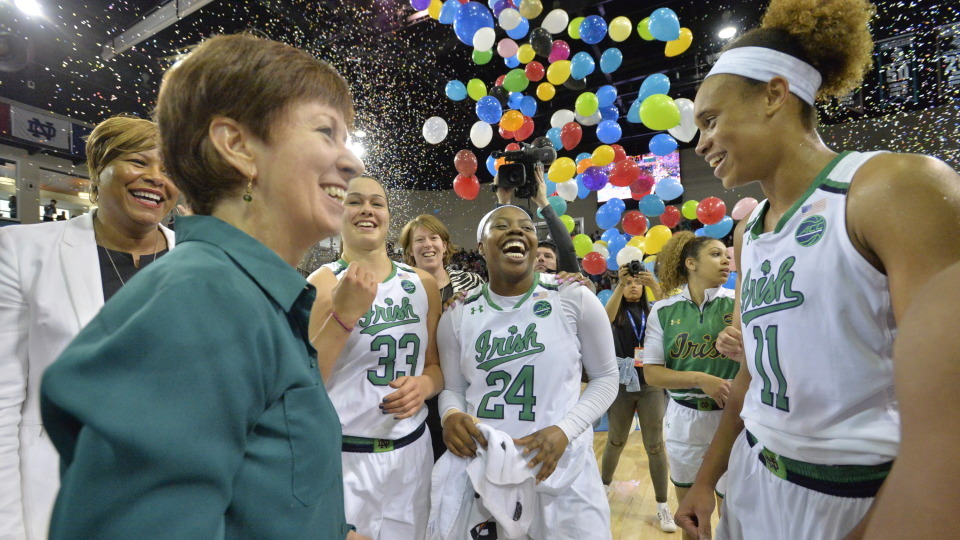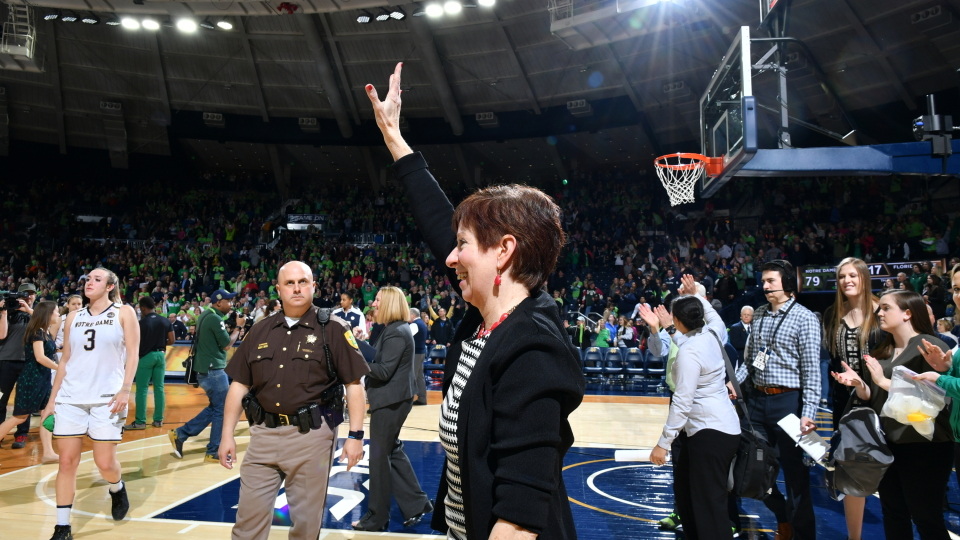March 18, 2017  Matt Cashore
Matt Cashore
By John Heisler
Building a championship program in any sport at any level is no easy task. It takes a mix of recruiting, coaching, institutional commitment, financial resources, facilities, promotion, multiple doses of just plain hard work–and a little luck. This is Part I of a series in which we take a look at several Notre Dame programs that have grown from humble beginnings to the point where they can compete year after year with the best in the country.
Ultra-successful University of Notre Dame women’s basketball coach Muffet McGraw–now the longest-tenured head coach on campus at 30 years–laughs at the notion of any sophistication level of her presentation when former athletics director Gene Corrigan hired her in 1987.
“Was there PowerPoint back then?” McGraw says with a laugh. “I’m not sure I remember.”
What McGraw does remember is a very modest level of expectations when she came to South Bend that first summer.
The Irish women’s program had scholarships. It had a tradition-rich place to play in the Athletic and Convocation Center. It had the prestige of a highly regarded University.
But there remained plenty of work to be done.
Says McGraw simply, “I think I came just hoping I would be able to stay.
“`Well, if it doesn’t work out . . . ?’ That was my first thought.
“I came at a time when it was so new. Notre Dame had only been Division I for a few years. They were coming off a losing season (12-15 in 1986-87), which actually is a good way to start.
“The expectations were low, attendance was low. Nationally we had never been to an NCAA Tournament and they only took 32 teams at that time.
“We were in the MCC (Midwestern Collegiate Conference), not a powerhouse conference at that time, so it was like starting from scratch. Now we’ve got to build a program.”
McGraw loved that her tenure began at the same time as what proved to be a solid trio of freshman players.
“I was fortunate that I came in with the recruiting class of Karen (Robinson), Sara (Liebscher) and Krissi (Davis),” she says. “So I kind of came at a good time. They had already committed and I came in June.
“We went from a losing record to winning 20 games (in McGraw’s first season in 1987-88).”
That first year featured 20-point losses to fourth-rated Tennessee and seventh-ranked Virginia–to go with a road victory over 17th -ranked Duke.
“We beat Louisiana Tech in a tournament in Philly (in late December 1990) and that was huge for us,” says McGraw. “We had a couple of opportunities to play some good teams, but back then it was so different.
“There were no recruiting lists, no McDonald’s All-Americans. So Karen Robinson (from Turnersville, New Jersey) coming in was one of the best players in her class (and ended up scoring 1,590 career points for the Irish). Then the next year we got Margaret Nowlin (from St. Paul, Minnesota) who was a really good player in her class. And things kind of started from there.”
The Irish played national power Tennessee annually–and that series, against widely respected Lady Vols head coach Pat Summit, became the first measuring stick for McGraw and her program.
Notre Dame lost to Tennessee 20 straight times between 1983 and 2008, finally breaking through with an NCAA regional win in Dayton in 2011. The Irish now have won six of the last seven games in the series.
“There were some growing pains there. Tennessee, that was the team. That was the team you were trying to beat,” says McGraw.
“They came in with their All-Americans and beat us pretty good one time. After the game, she (Summit) brought them back out on the floor and had them running sprints because they didn’t get enough of a workout during the game.
“That’s when you look at it and you think, `Oh, okay, we’re going to have get better really fast.’
“But it takes so long. It takes a long time to build your name and your reputation.
“You have to understand scheduling–that’s an art. We should have been playing teams that were on the bubble with us instead of trying to play the best teams. We did not do a great job of scheduling early on and then we were in a conference that did not have an automatic bid and so that did not really help us either.”
The Irish received NCAA Championship bids for the first time in 1992 (a first-round road loss at UCLA) when Robinson, Davis and Liebscher were seniors and 1994 (a first-round home defeat against Minnesota) when freshman Beth Morgan averaged 17.9 points per game.
Next came what McGraw terms the turning point in her build-out.
“The Big East is what made our program, no question,” she says. “Joining the Big East (beginning with the 1995-96 season) was the best thing we ever could have done for women’s basketball (at Notre Dame).
“We had made the tournament one or two years before that because the MCC finally got a bid. Then we immediately got credibility with the Big East–we played really good teams, everybody was well respected, and then we were successful, too. We’re finishing in the top three every year in the conference and starting to really build things.”
Admission to the Big East meant the Irish now compared their program to Connecticut in much the same way they earlier had evaluated themselves versus Tennessee.
“Connecticut hadn’t quite become what they are now, but they were the measuring stick.
“We played Tennessee in the (1997 NCAA) Final Four and got beat again. In 1997 we went, `Wow, Final Four.’ It had been 10 years for us to get to that point and it seemed like a long time in the evolution of a program. Then you’re thinking, a year later with a whole new team, would we ever get back?
“Even in `97 with Beth (Morgan, now Cunningham) and Katryna (Gaither), we were not a great team. We lost six or seven games, then we got to the Sweet 16 for first time. It was so exciting, and then we won the next game and thought, `Holy cow, we might keep winning.’ Then the bubble burst in the Final Four.
“Then 2001 was finally the year that got us over the top. We didn’t lose a game until mid-February, and we beat UConn in the regular season when they were number one and then again in the (NCAA national) semis.
“But I don’t think we ever sat down and said, `This is a Final Four team.’
“Never looked at it like that.”
After capturing the NCAA title in 2001 with all-stars Ruth Riley and Niele Ivey, the Irish didn’t get past the NCAA regional semifinals in any of the next nine seasons.
“After you win it and lose all the seniors I learned so much about how important confidence is,” says McGraw.
“We lost four or five seniors who played a lot, so we were starting over. That stretch right after that was the hardest of my career (including an uncharacteristic 18-12 season in 2005-06).
“You know what you’ve been able to do and yet you know how far away you are. So it’s trying to build it back up.
“And you learn about recruiting–that it’s about the fit. It’s not about the talent, it’s about the fit.”
Local star Skylar Diggins came to Notre Dame beginning with the 2009-10 season. A year later began the Irish run of five NCAA Final Fours (and four NCAA title game appearances) in six years. That consistently cemented Notre Dame’s name as one of the top programs in the country.
On top of that the Irish also posted victories over rival UConn seven times in eight games from 2011-13.
“The challenges now are meeting the expectations,” says McGraw.
“The stress or the pressure that I feel or the team feels is completely self-imposed and based on what other people think you’re supposed to be doing.
“You’re picked number one, you’re a number-one seed, you’re supposed to get to the Final Four. You’re supposed to win every single game and you’re supposed to win big — you’re not supposed to struggle.
“That’s a lot on the shoulders of 19- and 20-year-old kids.
“A player like Skylar could come in and manage that. You start to build around her with that kind of player–with high character kids who are hard workers, not necessarily All-Americans. We did not have that many All-Americans, but we just kept winning.”
For the record McGraw has produced five Associated Press first-team All-America picks in Riley, Diggins (a two-time first-teamer), Jewell Loyd and Kayla McBride. Three other players–Jacqueline Batteast, Ivey and Natalie Achonwa–won third-team honors. So far this year Brianna Turner has been a second-team selection by espnW.com.
McGraw’s interest in fit and chemistry prompted her to keep a comparatively small active roster. Instead of using the bottom half of her roster as a practice squad, she has her team work against an all-male team in workouts. She can afford to be selective about the players she recruits, leaning on her current players’ endorsement of visiting prospects when it comes to fit.
“It’s not like there’s a guarantee,” she says. “Then the next year I would always start to think, `You’re a junior and you have not put the work in and you don’t know how hard those other people had to work to get you there.’
“You worry every year that you’re going to take a step back.”
McGraw loves her current staff–including two former college head coaches in Carol Owens (she was head coach at Northern Illinois for five years) and Cunningham (she was at Virginia Commonwealth for nine seasons) and two of McGraw’s former All-America players in Cunningham and Ivey.
McGraw’s impressive coaching tree includes former Irish assistants (and now head coaches) Bill Fennelly at Iowa State, Coquese Washington at Penn State, Kevin McGuff at Ohio State and Jonathan Tsipis at Wisconsin.
After 30 seasons in South Bend she has come up with a personal formula for success, and it involves a laser focus.
“I’m in a bubble,” she says.
“I do not read anything. I do not ever go online.
“I look at scores, and that’s it.
“I don’t want to know what people say about us. I don’t care about bracketology. I don’t care what they are saying. I just try to focus on what’s at hand.”
One of 14 finalists for the Naismith Memorial Basketball Hall of Fame’s Class of 2017, McGraw leans heavily on her own staff–and only a few others.
“Matt (her husband) is in the bubble with me. I’ll call (current Chattanooga and former St. Joseph’s, Vanderbilt and Ohio State head coach) Jim Foster once in a while to talk about things.
“I have a small support group that knows nothing, really, about basketball.”
Her Notre Dame program and brand are now solid enough across the board to allow McGraw to focus on one thing:
“I never talk to the team about winning,” she says.
“It’s all about, `This is how we are going to play.'”
McGraw’s teams have earned the respect of others in great part because of their unselfishness, exquisite passing and movement without the basketball.
Tweeted espn.com‘s Mechelle Voepel after Notre Dame’s fourth straight ACC Tournament championship earlier this month: “Congrats to Notre Dame . . . Consistent excellence of the Irish has been something special to watch.”
This week Notre Dame, for the sixth consecutive year (and seventh time overall under McGraw), is one of the number-one seeds in the NCAA Championship bracket.
And McGraw understands full well all that comes with that.
Senior associate athletics director John Heisler has been covering the Notre Dame athletics scene since 1978. Watch for his weekly Sunday Brunch offerings on UND.com.
 TheACC.com
TheACC.com







